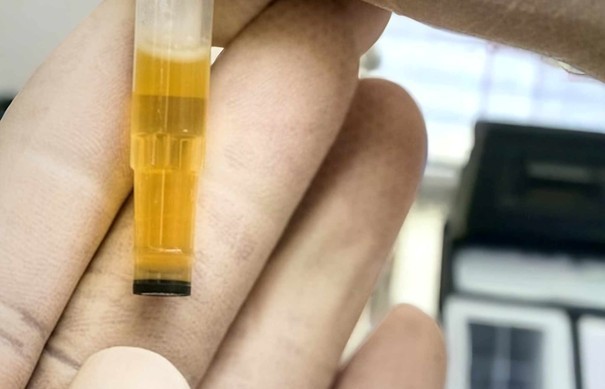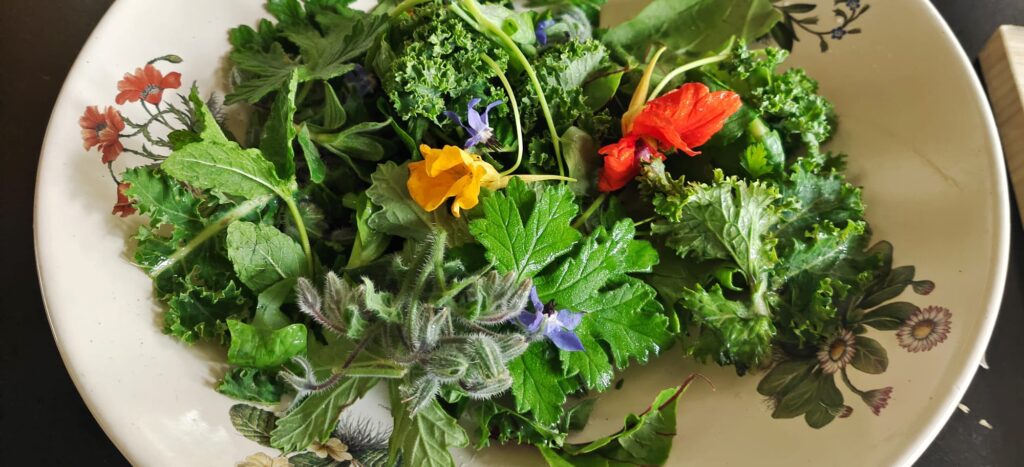
Spring is here. A gentle breeze through a freshly opened window. A warm mug between your hands. The scent of newness in the air – not strong, but familiar, almost like hope. And maybe this year you’re feeling it too – that quiet urge to take care of yourself a little differently. Not with pressure or perfection… but with presence. With kindness. With small, tender choices. If that’s where you are – welcome. You’ve come to the right place.
Spring is a natural invitation to reset

For years I’ve been studying how our bodies react to invisible chemicals in our everyday environment – endocrine-disrupting chemicals (EDCs), or as I call them, hormonal cheaters.
They show up in plastic bottles, receipts, face creams, cleaning sprays – even the clothes we wash. They mimic our hormones, confuse our inner balance, and slowly wear down our energy, mood, metabolism, and well-being.
But here’s the good news. This isn’t about fear.
It’s about awareness.
And gentle, science-based ways to help your body let go – so it can thrive again.
No stress. No guilt. Just small actions with big ripple effects.
You don’t have to “fix” anything.
You just have to care enough to start.
That’s what this 3 week detox is all about.
Week 1: Detoxify your space – and breathe again

Let’s start where we spend most of our time: at home.
Ten years ago, I opened the cupboard under my bathroom sink and realised I didn’t recognise half of what was in it. Baby lotion, glittery shampoo, a “fresh scent” cleaner I bought on sale. Reading the labels, I found parabens, phthalates and polyethylene glycols – ingredients I now know are hormone disruptors.
And something clicked: why was I putting more chemicals on my skin than in my food?
So I made a rule: if I don’t understand the label, it doesn’t belong on my skin, in my lungs or around my children.
Try these with me this week:
☐ Switch from plastic to glass containers
☐ Store leftovers in ceramics, not cling film
☐ Use fragrance-free soaps and natural cleaners
☐ Open your windows twice a day – even for 10 minutes
☐ Look at your cosmetics – not with guilt, but with curiosity
I promise: your home doesn’t have to smell like lemon detergent to be clean.
Let it smell natural. Or open air. That’s how you’ll know it’s working.
And something else will happen – your breath will feel deeper, your sleep more restful, your body just a little less burdened.
Week 2: Support your body — gently

Your body is already detoxing. Every hour. Every day.
Your liver, kidneys and intestines are doing their quiet work. They don’t need punishment. They need support. You don’t need celery juice or supplements that cost more than your groceries. You need food that whispers: I’ve got you.
So this week, give your body what it loves:
☐ A handful of organic broccoli, arugula or cabbage every day
☐ Fibre, fibre, fibre – from oats, chia, lentils – think warm and grounding
☐ Herbal teas like nettle, dandelion and fennel – gentle, earthy, soothing
☐ Water – clear, clean, filtered – in a real glass or stainless, not plastic
☐ Less plastic and processed food, more fresh, organic, home-cooked food
This is the week you’ll feel lighter. Not in size – in energy.
You’ll find yourself saying: I don’t need another coffee… I feel good.
And when that happens – smile. Your body is already saying thank you.
Week 3: Change your habits — not your whole life

It’s not about buying a whole new life. It’s about noticing. How often we wash our clothes in strong detergents. How quickly we say yes to plastic bags, coffee lids or receipts. How normalised it feels to microwave lunch in plastic. But awareness is where healing begins.
This week, slow down and change gently:
☐ Use an eco-labelled detergent – no strong scents needed.
☐ Let clothes dry in the air – let the sun be your softener.
☐ Say no, thanks to receipts and plastic bags.
☐ Choose natural fibres when you buy new – cotton, linen, bamboo.
☐ Bring your own container to a coffee shop. Not to be trendy. To be true to yourself.
You don’t have to do this forever.
Just today.
Then tomorrow…
Until these little habits become your new rhythm – rooted in love, not fear.
What happens after 3 weeks?

You feel detoxED.
Less tired. Less foggy.
More like yourself, before the world told you to rush, scrub and consume.
Your body relaxes.
Your skin breathes.
Your hormones start to whisper back into balance.
This is self-care. This is science. This is One Health.
What’s good for you is also good for the planet.
Less plastic. Less pollution. Less toxicity in our water and wildlife.
It’s not about clean living.
It’s about living connected — to yourself, to your environment, to your future.
You don’t have to be perfect.
Just be present.
Want to start your own detox journey?

You don’t need a new lifestyle.
You need a soft reset – one that starts today, with one drawer, one label, one breath.
I’ll be there when you’re ready.
With science. With heart. With you.
Dr Aleksandra
askdraleksandra@detoxed.eu
@AskDrAleksandra
@checked.detox
Now go make the tea. Open a window. And begin.
Scientifically proven studies:
Rutkowska A., Olsson A., Piotrowska-Szypryt M., Namiesnik J.: Changes in daily life reduce indoor exposure to selected endocrine disruptors in the home environment: a pilot intervention study. Acta Biochim Pol. 2020;67(2):273-6.
Curl C.L., Beresford S.A., Fenske R.A., i wsp.: Estimating pesticide exposure from dietary intake and organic food choices: the Multi-Ethnic Study of Atherosclerosis (MESA). Environ Health Perspect. 2015;123(5):475-83.
Torjusen H., Brantsaeter A.L., Haugen M., i wsp.: Reduced risk of pre-eclampsia with organic vegetable consumption: results from the prospective Norwegian Mother and Child Cohort Study. BMJ Open. 2014;4(9):e006143.
Buckley J.P., Kim H., Wong E., Rebholz C.M.: Ultra-processed food consumption and exposure to phthalates and bisphenols in the US National Health and Nutrition Examination Survey, 2013-2014. Environ Int. 2019;131:105057.
Aozasa O., Ohta S., Nakao T., i wsp.: Enhancement in fecal excretion of dioxin isomer in mice by several dietary fibers. Chemosphere. 2001;45(2):195-200.
Kohda N., Inoue S., Noda T., Saito T.: Effects of chitosan intake on fecal excretion of bisphenol A and di(2-ethyl)phthalate in rats. Biosci Biotechnol Biochem. 2012;76(4):732-6.

